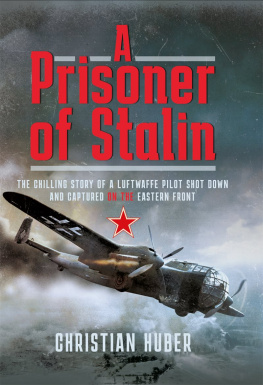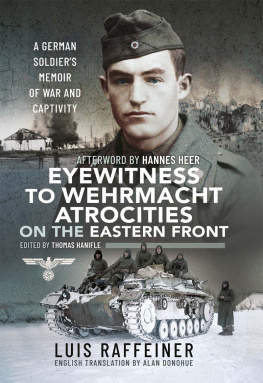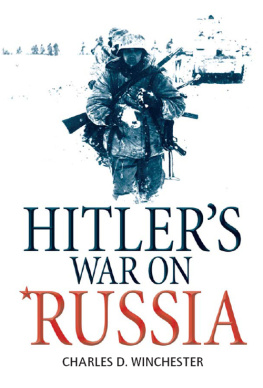

Note: Whereas the military events correspond to the historical record, some of the persons mentioned herein have been given an alias to protect their identity.
Original German language edition titled Das Ende vor Augen, first published by Rosenheimer in 2012
2012 Rosenheimer Verlaghaus GmbH & Co. KG, Rosenheim, Germany
First published in 2016
The History Press
The Mill, Brimscombe Port
Stroud, Gloucestershire, GL5 2QG
www.thehistorypress.co.uk
This ebook edition first published in 2016
All rights reserved
Christian Huber, 2012
English edition The History Press, 2016
Translation Geoffrey Brooks, 2016
The right of Christian Huber to be identified as the Author of this work has been asserted in accordance with the Copyright, Designs and Patents Act 1988.
This ebook is copyright material and must not be copied, reproduced, transferred, distributed, leased, licensed or publicly performed or used in any way except as specifically permitted in writing by the publishers, as allowed under the terms and conditions under which it was purchased or as strictly permitted by applicable copyright law. Any unauthorised distribution or use of this text may be a direct infringement of the authors and publishers rights, and those responsible may be liable in law accordingly.
EBOOK ISBN 978 0 7509 6918 5
Original typesetting by The History Press
eBook converted by Geethik Technologies
CONTENTS
INTRODUCTION
The bloody demise of the Third Reich the famed Gtterdmmerung, the Twilight of the Gods has been much explored in recent years. A number of English-language history books have sought to reconstruct the final days of Hitlers odious Reich, with varying results. But, in the vast majority of examples, one voice is crucially absent: that of the defeated German military.
This is a curious omission. It may be, of course, that many English-language historians lack the language skills to incorporate primary sources in German, or one might assume that there is some disinclination to include German military accounts, maybe for fear of arousing sympathy for the defeated enemy. But, the real reason lies with Germanys curious process of coming to terms with its past, Vergangenheitsbewltigung, in which the national mantra of contrition and collective guilt has effectively silenced the voices of veterans many of them entirely blameless who might otherwise have found publication. It is interesting that it is only in the last decade or so that the accounts of ordinary German soldiers have found an audience in Germany at all.
All of which should serve to explain why this book is so important. Journalist Christian Huber has spent years collecting and editing the personal accounts of German veterans from southern Bavaria. The selection presented here is only a part of that collection; a total of only ten accounts, it is but a drop in the ocean of German memory, but it nonetheless has significant breadth, with contributions from members of the Wehrmacht, Waffen-SS and Luftwaffe ground forces.
There is also a good geographical and chronological spread. One contributor, for instance, provides a fascinating account of waiting on the banks of the River Bug in occupied Poland in June 1941 for the order to invade Stalins Soviet Union. Another tells the story of a bloody engagement with Yugoslav partisans in Bosnia in 1943.
The contributions surrounding events at the end of the war are similarly rich and varied. One describes being captured by the Soviets in the ruins of Knigsberg; another found himself in hostile Czechoslovakia; a third escaped the Heiligenbeil Cauldron in East Prussia, only to be thrust back into the Battle for Berlin. For all of them, the imperative was to head west: to surrender to the Americans and thereby avoid the grim fate that awaited them at Soviet hands a sojourn of hard labour in Siberia.
The range of emotions on display are also interesting. For many, the war by its close appears almost to have taken on a life of its own. It had become something like a force of nature, something that had to be endured, and survived, but over which the individual could exert no influence at all. In addition, very few of the soldiers seem to have had the wherewithal and the mental strength to escape their fate the Waffen-SS man being one exception.
In all, despite its relative brevity and its small sample size, this is a book with much wider horizons than the reader might at first suspect. It gives a taste of the German militarys view of the dying days of the war: the desperation, the resignation and the fear. As such it makes a genuine contribution to our understanding of a crucial and highly dramatic period.
Even if the political will existed to carry it out, it is probably too late now for a concerted oral history programme in Germany to record the memories of war veterans for posterity and for the benefit of historians. Nonetheless, for all their limitations, books such as this one are a welcome start along that road. They allow us a glimpse of a world of memory that has been neglected for too long and is now fast disappearing. For that they should be welcomed.
Roger Moorhouse
2016
PROLOGUE
And suddenly we are consumed by a fear that we have come too far ever to see the homeland again. What words could better describe the morale of the German soldier in the last few months of the Second World War than these by Bertolt Brecht? Fears for ones family the bomber war had long reached out to even the smallest towns fears for ones own life, fears about the impending defeat and an uncertain future: especially in the final and most bloody phase of the war, German soldiers were forced to shoulder an inhuman load. The end before their eyes, not one could know what the morrow would bring.
Over the years, the author contacted numerous former participants from southern Bavaria. From these meetings many friendships evolved. In long talks, German soldiers provided their very personal memories of the end of the war, made diaries and manuscripts available. From these sources ten differing stories bring the reader closer to the horror of it all.
1
SUMMER NIGHT
PETER STUFFER, OBERGEFREITER, FROM RUHPOLDING, EASTERN FRONT, ARMY GROUP SOUTH
June 1941. I remember it all as if it were yesterday. We had been on this bank of the Bug River for days. Faces bronzed, dust between the teeth. We were Franz Schenkenbach, known as a Prussian thoroughbred because he knew no Bavarian dialect and couldnt understand our jokes; little Hans Reichl from Raubling/Inntal, Georg Schorsch Kramer from Hundham/Oberland, called the Professor for his wire-rimmed spectacles; Gerd Ziefer, a great oak of a man. Also Auer, Unterhuber, Loferer, Meitinger, Bader, Rampfl, Baier, 120 others and myself.
We had plenty to eat and often would take long naps during the midday heat after gorging ourselves from tins. We slept sitting, standing and even walking, water bottle in hand. Little Hans Reichl was on watch leaning against a tree, rifle over his shoulder, his steel helmet pushed forward to cover his face. He was having forty winks when his knees buckled. He had fallen asleep in broad daylight. The muzzle of his carbine went through his upper lip and struck his front incisors. The first man of our company to be wounded on this bank of the Bug River. After a couple of days it had healed enough for him to lie alongside us in the trench. Bad luck for him, as we were were to find out.
Next page












